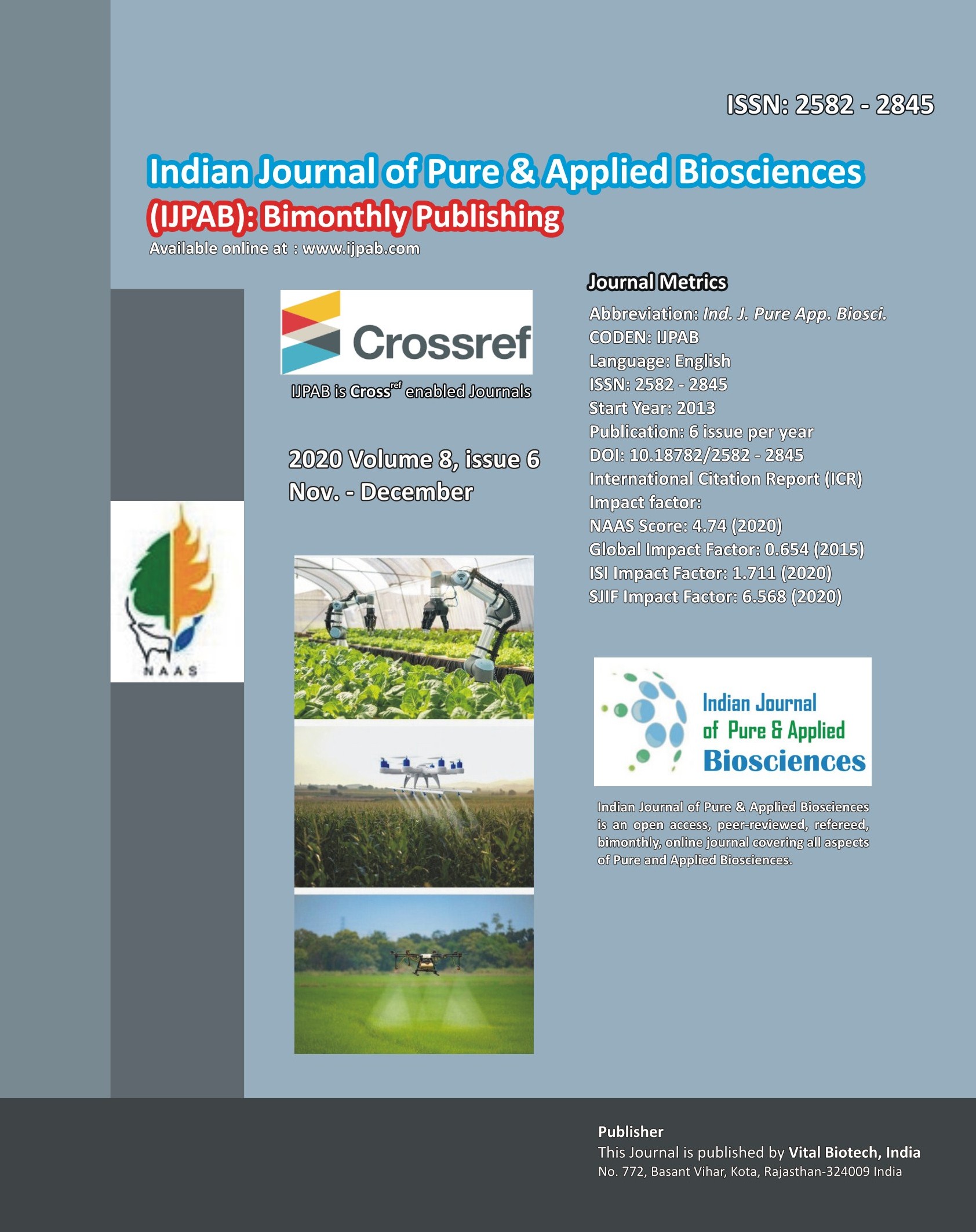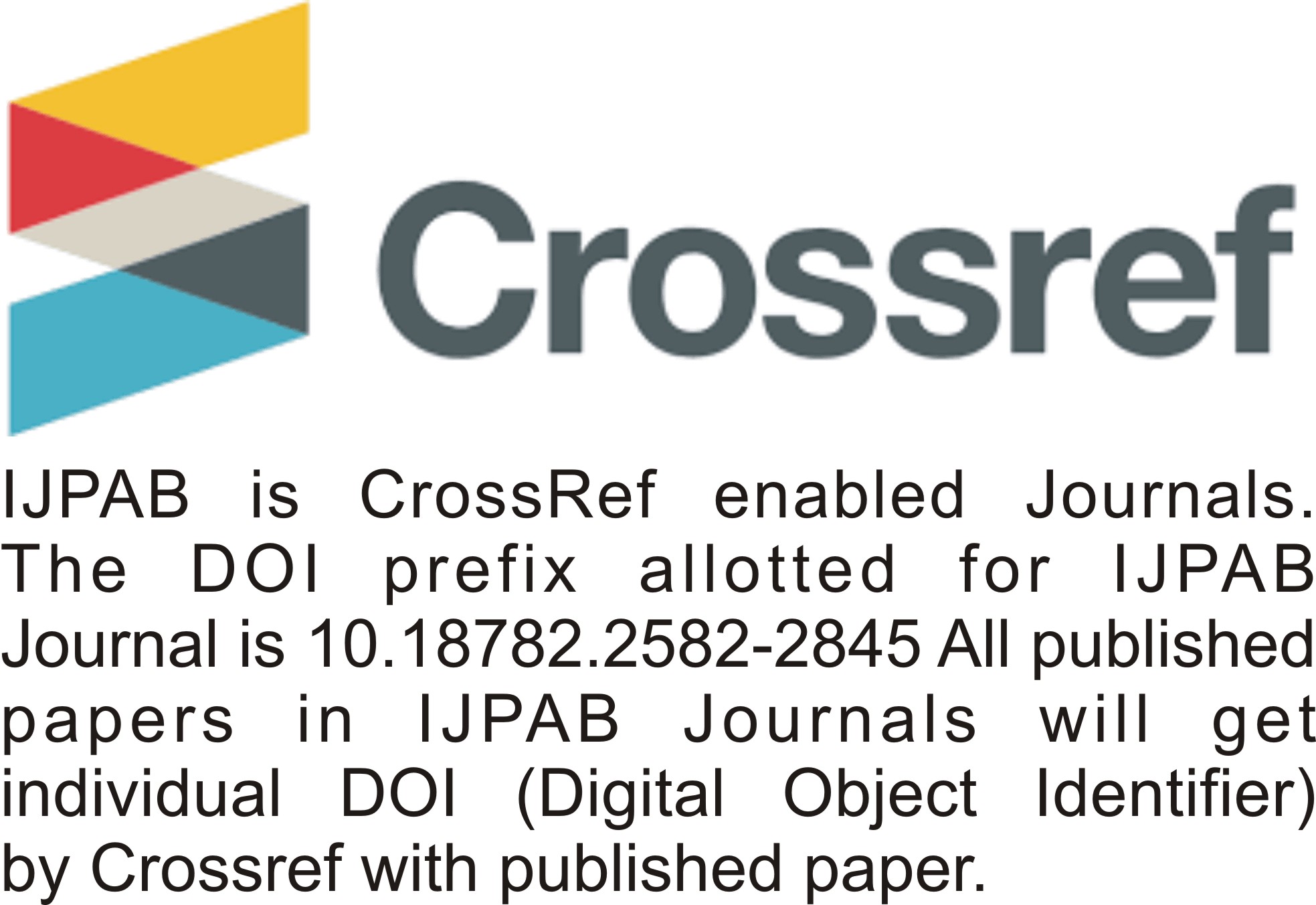
-
No. 772, Basant Vihar, Kota
Rajasthan-324009 India
-
Call Us On
+91 9784677044
-
Mail Us @
editor@ijpab.com
Indian Journal of Pure & Applied Biosciences (IJPAB)
Year : 2020, Volume : 8, Issue : 6
First page : (511) Last page : (514)
Article doi: : http://dx.doi.org/10.18782/2582-2845.8483
Socio-Economic Status of Tomato Growers in Madurai District of Tamil Nadu
M. Sangavi1, A. Janaki Rani2*, J. Pushpa3 and K. Prabakaran4
1PG Scholar, Department of Agricultural Extension and Rural Sociology,
Agricultural College and Research Institute,
2Associate Professor and Head, Department of Extension Education and
Communication Management, Community Science College & Research Institute,
3Professor, Department of Agricultural Extension & Rural Sociology,
Agricultural College and Research Institute,
4Assistant Professor (Agricultural Statistics),
Department of Agricultural Economics, Agricultural College and Research Institute,
TNAU, Madurai, Tamil Nadu, India
*Corresponding Author E-mail: janakimurugan8@gmail.com
Received: 10.10.2020 | Revised: 16.12.2020 | Accepted: 22.12.2020
ABSTRACT
Tomato is one of the most vital vegetable crop which is cultivated for its fleshy fruit and considered as vital commercial and dietary vegetable. Tamil Nadu stands twelfth place in the area and production of tomato. Even though the production is high, the farmers are struggling a lot to come up well to meet out the demand of growing population. In this connection, the socio-economic characteristics of tomato growers will give a picture of their characteristics towards tomato cultivation. Hence, the study was conducted in Madurai district of Tamil Nadu with 90 tomato growers. The structured interview schedule is used for collecting data. The statistical tools such as mean, standard deviation, frequency and percentage analysis were used. From the findings, it is found that majority of the respondents are middle aged (40.00%) and primary and middle school education (45.56%) and having one to two acre of land with more than twenty years of experience. They had below Rs.50,000 as annual income. They had medium information source utilization, economic motivation, scientific orientation and innovativeness and taking joint decision with family members, neighbours and relatives.
Keywords: Tomato growers, Socio-economic profile, Innovativeness, Decision making behaviour.
Full Text : PDF; Journal doi : http://dx.doi.org/10.18782
Cite this article: Sangavi, M., Janaki Rani, A., Pushpa, J., & Prabakaran, K. (2020). Socio-Economic Status of Tomato Growers in Madurai District of Tamil Nadu, Ind. J. Pure App. Biosci. 8(6), 511-514. doi: http://dx.doi.org/10.18782/2582-2845.8483
INTRODUCTION
Tomato is considered as a major vegetable crop. It is largely cultivated and consuming crop in the world. It is a good source of phytochemical lycopene and vitamin-c. Among all vegetables, tomato is the most demandable crop, because they are generally used for salads and ingredients for various prepared dishes and pickle making.
Tamil Nadu stands twelfth place in the area and production (Horticulture statistics at a Glance, 2018). Even though the production is high, the farmers are struggling a lot to come up well.
In spite of our production is high, productivity is lower. It may be due to various reasons such as lack of awareness, low knowledge, less availability of resources, less resource utilization behavior, low level of contact with extension officials among the farmers etc., Technology and communication pattern are the key elements in the growth and development of communities that predominantly depend on agriculture. If the communication about new varieties, technologies or information about agriculture from one farmer to other farmer and group of farmers is proper, then the production and productivity will be higher and automatically leads to first position in vegetable production and productivity. Hence, there is a need to study the socio-economic characteristics of the farmers towards tomato cultivation practices.
MATERIALS AND METHODS
A study was conducted in Panniyan and Kannanur villages of Chellampatti block of Madurai district. The present study was confined to ex-post facto research design. Being a vegetable belt, 90 tomato growers were selected randomly from two villages for the study. The data was collected for this study by interview schedule. The collected data were analysed, tabulated and interpretated. The statistical tools were used such as mean, standard deviation, frequency and percentage analysis.
RESULTS AND DISCUSSION
The findings of this study have been presented in the Table 1. From the Table 1, it was found that majority of the farmers were middle age farmers (40.00%) followed by old age farmers (37.78%). The main reason is that the study area is a vegetable belt and hence majority of the participants involved in tomato cultivation from their childhood onwards.
35.56 per cent belonged to primary school education followed by middle school education (30.00%). Lack of educational institutions in the study area for higher studies might be the possible reasons for majority under primary and middle school education. Most of the parents expressed that if their children worked in vegetable cultivation, the income and the family status will be increased. Hence, they were not allowing their children for higher studies. 47.77 per cent were having less than one acre of land. Most of the farmers were cultivating tomato by marginal and small farmers and as agricultural labours. Fragmentation of traditional land holdings among relatives over a period of time might be the reason for the medium to low level of land holdings.
Table 1: Distribution of respondents according to their socio-economic profile characteristics (N=90)
S.No |
Personal characteristics |
Number of respondents |
Percent |
1 |
Age |
||
1 |
Young (< 35 years) |
20 |
22.22 |
2 |
Middle (35-45 years) |
36 |
40.00 |
3 |
Old (> 45 years ) |
34 |
37.78 |
2 |
Educational Status |
||
1 |
Illiterate |
4 |
4.44 |
2 |
Functionally literate |
11 |
12.22 |
3 |
Primary School Education |
32 |
35.56 |
4 |
Middle School Education |
27 |
30.00 |
5 |
Secondary School Education |
11 |
12.22 |
6 |
Collegiate education |
5 |
5.56 |
3 |
Farm Size under cultivating tomato |
|
|
1 |
Low (< 1 acre) |
41 |
45.56 |
2 |
Medium (1-2 acre) |
43 |
47.77 |
3 |
High (> 2 acre) |
6 |
6.67 |
4 |
Farming experience |
|
|
1 |
>10 years |
11 |
12.22 |
2 |
10 to 20 years |
20 |
22.22 |
3 |
Above 20 Years |
59 |
65.56 |
5 |
Annual Income |
|
|
1 |
Below 50,000 |
41 |
45.56 |
2 |
50,000 to 1,00,000 |
35 |
38.89 |
3 |
Above 1,00,000 |
14 |
15.55 |
6 |
Information Source Utilisation |
|
|
1 |
Low |
33 |
36.67 |
2 |
Medium |
41 |
45.56 |
3 |
High |
16 |
17.78 |
7 |
Training |
||
1 |
No training |
37 |
41.11 |
2 |
One training |
39 |
43.33 |
3 |
Two training |
14 |
15.56 |
8 |
Economic motivation |
||
1 |
Low |
25 |
27.78 |
2 |
Medium |
53 |
58.89 |
3 |
High |
12 |
13.33 |
9 |
Scientific Orientation |
||
1 |
Low |
22 |
24.44 |
2 |
Medium |
50 |
55.56 |
3 |
High |
18 |
20.00 |
10 |
Innovativeness |
|
|
1 |
Low |
30 |
33.33 |
2 |
Medium |
34 |
37.78 |
3 |
High |
26 |
28.89 |
11 |
Decision making behaviour |
|
|
1 |
Independent decision / self decision |
9 |
10.00 |
2 |
Joint decision with family members /neighbours/ relatives |
30 |
33.33 |
3 |
Joint decision with Progressive farmers |
22 |
24.44 |
4 |
Joint decision with Extension officials (ADH office) |
5 |
5.56 |
5 |
Joint decision with Private consultants and input dealers |
24 |
26.67 |
65.56 per cent had more than twenty years of experience. The study area Chellampatti block is a vegetable belt and in most of the farmers household vegetables were grown and the farmers also working in other vegetable fields also might be the reasons for high level of farming experience. 45.56 per cent had below fifty thousand as their annual income. It was due to the expenditure towards high cost inputs, pesticides application, labour charge and unexpected expenditure.
45.56 per cent belonged to medium information source utilisation, Even though the farmers are getting information from different sources, while seeing the utilization pattern seem to be medium only. This might be due to lack of utilization of Extension officials, institutional sources, mass media for getting information. 43.33 per cent were attended at least one training. The respondents had attended training programmes organised by Assistant Director of Horticulture in Chellampatti and Keelapatti Co-operative Society. The respondents were also found to have participated in informal trainings conducted by private input dealers. They attended the training such as drip irrigation, new farm machineries, new technologies of vegetable cultivation, organic vegetable cultivation, Panchakavya preparation and its uses etc.
58.89 per cent belonged to medium level of economic motivation. The low to medium level of farm size and lack of interest on the full scale adoption of new technologies might be the contributing factors for medium level of economic motivation.
55.56 per cent belonged to medium level of scientific orientation. The awareness created by KVK and Agricultural College and Research Institute, Madurai and State Department of Horticulture and might be the reason for the medium to high level of scientific orientation.
37.78 per cent belonged to medium level of innovativeness. Medium level innovativeness might be due to the motivation given by progressive farmers in the study, relative advantage of high yielding varieties, protray nursery etc.
33.33 per cent have taken decision in consultation with family members, neighbours and relatives followed by consultation with private consultants and input dealers (26.67%). Most of the respondents taking decision in consultation with their family members. Because the respondents felt that the family and relations are very supportive for the tomato and vegetable cultivation and even if they face any loss. Further, private consultant and input dealer and progressive farmers were the driving force for taking decision on variety selection, fertilizer and pesticide application, quantity and time of application.
CONCLUSION
From the findings , it is concluded that majority of the respondents are middle aged (40.00%) and primary and middle school education (45.56%) and having one to two acre of land with more than twenty years of experience.
They had below Rs.50,000 as annual income. They had medium information source utilization, economic motivation, scientific orientation and innovativeness and taking joint decision with family members, neighbours and relatives. It may due to the various reasons such as lack of awareness, less knowledge, rare contact with extension officials, less availability of resources, lack of information sharing behaviour. Hence, different exposure on tomato cultivation technologies has to be given to the farmers to improve their technical knowledge and frequent contact of extension officials and scientists will influence the farmers, socio-personal characteristics which in turn increase the yield and income of the farmers in order to meet the growing demand of vegetables.
So extension officials should make effort to improve the credibility of Krishi Vigyan Kendra, Non-Governmental Oraganisation and State Agricultural Universities. It will act as a grass root for adopting the technologies.
REFERENCES
Sharma, L. K., & Gupta, V. (2009). Knowledge and constraints in scientific cultivation of chilli among the farmers, Raj. J. Extn. Edu. 17&18, 60-64, 2009 & 2010.
Singh, P. K., Barman, K. K., & Varshney, J. G. (2011). Adoption behaviour of vegetable growers towards improved technologies, Indian Res. J. Ext. Edu. 11(1).
Pandya, C. D., Bhatt, S. T., & Chauhan, N. M. (2013). Knowledge and Adoption Level of Farmers about Scientific Cultivation of Okra in Tapi District, Guj. J. Ext. Edu 24,December.

